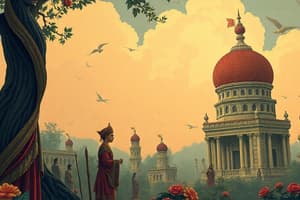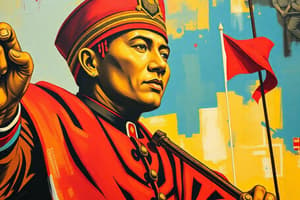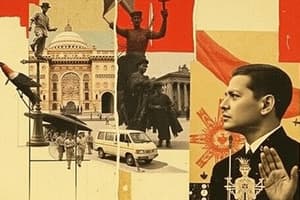Podcast
Questions and Answers
Indonesia's geographical location between two continents and two oceans has significantly influenced its history. Which continents and oceans are those?
Indonesia's geographical location between two continents and two oceans has significantly influenced its history. Which continents and oceans are those?
- North America and South America; Arctic and Antarctic
- Asia and Australia; Indian and Pacific (correct)
- Europe and Africa; Atlantic and Indian
- Antarctica and Asia; Pacific and Atlantic
The desire to spread Christianity was one of the motivations of the Western nations to explore and colonize other parts of the world. What is the term used to describe this motivation?
The desire to spread Christianity was one of the motivations of the Western nations to explore and colonize other parts of the world. What is the term used to describe this motivation?
- Gold
- Glory
- Geography
- Gospel (correct)
Which of the following best describes the main goal of the Vereenigde Oostindische Compagnie (VOC) establishment?
Which of the following best describes the main goal of the Vereenigde Oostindische Compagnie (VOC) establishment?
- To eliminate unhealthy competition among Dutch traders (correct)
- To promote fair trade practices among European nations
- To spread Christianity throughout Southeast Asia
- To establish democratic governance in the East Indies
What was the main objective of Daendels in constructing the Anyer-Panarukan road during his rule as Governor-General?
What was the main objective of Daendels in constructing the Anyer-Panarukan road during his rule as Governor-General?
The Cultuurstelsel, or forced cultivation system, implemented by Van den Bosch, was triggered by what event?
The Cultuurstelsel, or forced cultivation system, implemented by Van den Bosch, was triggered by what event?
In the context of the Agrarische Wet (Agrarian Law) of 1870, what was the main change regarding land use in the Dutch East Indies?
In the context of the Agrarische Wet (Agrarian Law) of 1870, what was the main change regarding land use in the Dutch East Indies?
Who led the Aceh War against the Dutch, showcasing Acehnese resistance to colonial rule?
Who led the Aceh War against the Dutch, showcasing Acehnese resistance to colonial rule?
Which of the following tactics did the Dutch employ during the Aceh War (1899-1904)?
Which of the following tactics did the Dutch employ during the Aceh War (1899-1904)?
What was the primary reason for the suffering of the Javanese people, particularly farmers, leading up to the Diponegoro War?
What was the primary reason for the suffering of the Javanese people, particularly farmers, leading up to the Diponegoro War?
Which of the following events marked the beginning of Japan's military expansion in Asia, eventually leading to their occupation of Indonesia?
Which of the following events marked the beginning of Japan's military expansion in Asia, eventually leading to their occupation of Indonesia?
What strategy did Japan initially employ to gain support from the Indonesian population during their occupation?
What strategy did Japan initially employ to gain support from the Indonesian population during their occupation?
What was the primary purpose of the 'Pusat Tenaga Rakyat' (PUTERA) organization, established during the Japanese occupation?
What was the primary purpose of the 'Pusat Tenaga Rakyat' (PUTERA) organization, established during the Japanese occupation?
Under Japanese occupation, Jawa Hokokai was closely supervised by Japan in order to...
Under Japanese occupation, Jawa Hokokai was closely supervised by Japan in order to...
How did the Japanese occupation compare to Dutch colonialism in terms of exploiting Indonesia's natural resources?
How did the Japanese occupation compare to Dutch colonialism in terms of exploiting Indonesia's natural resources?
What economic change occurred in Indonesia as a result of colonialism and Japanese occupation?
What economic change occurred in Indonesia as a result of colonialism and Japanese occupation?
What was one of the main goals of the Dutch colonial presence in Indonesia, relating to spice trade?
What was one of the main goals of the Dutch colonial presence in Indonesia, relating to spice trade?
Which of the following organizations emerged in Indonesia as a result of colonial and Japanese rule, contributing to national movement?
Which of the following organizations emerged in Indonesia as a result of colonial and Japanese rule, contributing to national movement?
Besides economic and political changes, how did colonialism and Japanese occupation impact Indonesian society?
Besides economic and political changes, how did colonialism and Japanese occupation impact Indonesian society?
Which of the followings correctly describes the impact of colonial rule and Japanese occupation on education in Indonesia?
Which of the followings correctly describes the impact of colonial rule and Japanese occupation on education in Indonesia?
During the period of Dutch colonialism, the policy of economic exploitation known as 'monopoli perdagangan' directly led to what outcome for the Indonesian people?
During the period of Dutch colonialism, the policy of economic exploitation known as 'monopoli perdagangan' directly led to what outcome for the Indonesian people?
Suppose a historian is researching the long-term effects of the 'Cultuurstelsel' on Indonesian agriculture. Which outcome would be the MOST significant in demonstrating its lasting negative impact?
Suppose a historian is researching the long-term effects of the 'Cultuurstelsel' on Indonesian agriculture. Which outcome would be the MOST significant in demonstrating its lasting negative impact?
If a scholar argues that the Agrarische Wet (Agrarian Law) while seemingly progressive, ultimately served colonial interests, which evidence would BEST support this claim?
If a scholar argues that the Agrarische Wet (Agrarian Law) while seemingly progressive, ultimately served colonial interests, which evidence would BEST support this claim?
During the Japanese occupation, if an Indonesian were to publicly criticize the Jawa Hokokai organization, what would MOST likely be the consequence?
During the Japanese occupation, if an Indonesian were to publicly criticize the Jawa Hokokai organization, what would MOST likely be the consequence?
Consider the complex interplay of geographical factors, economic motivations, and socio-political strategies employed by colonial powers in Indonesia. Which statement BEST encapsulates the overarching theme of Indonesian history during the colonial period?
Consider the complex interplay of geographical factors, economic motivations, and socio-political strategies employed by colonial powers in Indonesia. Which statement BEST encapsulates the overarching theme of Indonesian history during the colonial period?
Imagine a hypothetical scenario: If the VOC had prioritized fair trade practices and mutual benefit with the Indonesian kingdoms instead of pursuing monopolistic policies and exploitation, how might this have ALTERED the trajectory of Indonesian history?
Imagine a hypothetical scenario: If the VOC had prioritized fair trade practices and mutual benefit with the Indonesian kingdoms instead of pursuing monopolistic policies and exploitation, how might this have ALTERED the trajectory of Indonesian history?
Flashcards
Geographic Condition
Geographic Condition
The study of the earth's physical features and how they affect human activities.
Imperialism
Imperialism
Desire to spread influence and conquer territories.
Colonialism
Colonialism
A policy extending a country's power and influence through colonization.
Industrial Revolution
Industrial Revolution
Signup and view all the flashcards
Resource Exploitation
Resource Exploitation
Signup and view all the flashcards
Vereenigde Oostindische Compagnie (VOC)
Vereenigde Oostindische Compagnie (VOC)
Signup and view all the flashcards
Market Monopoly
Market Monopoly
Signup and view all the flashcards
Penguasaan Pasar
Penguasaan Pasar
Signup and view all the flashcards
Devide et Impera
Devide et Impera
Signup and view all the flashcards
Kerja Paksa
Kerja Paksa
Signup and view all the flashcards
Sistem Tanam Paksa (Cultuur Stelsel)
Sistem Tanam Paksa (Cultuur Stelsel)
Signup and view all the flashcards
Free Market
Free Market
Signup and view all the flashcards
Perang Padri
Perang Padri
Signup and view all the flashcards
Perang Aceh
Perang Aceh
Signup and view all the flashcards
Perang Diponegoro
Perang Diponegoro
Signup and view all the flashcards
Masa Pendudukan Jepang
Masa Pendudukan Jepang
Signup and view all the flashcards
Gerakan 3A
Gerakan 3A
Signup and view all the flashcards
Pusat Tenaga Rakyat (Putera)
Pusat Tenaga Rakyat (Putera)
Signup and view all the flashcards
Seinendan
Seinendan
Signup and view all the flashcards
Romusha
Romusha
Signup and view all the flashcards
Adat
Adat
Signup and view all the flashcards
Nasionalisme
Nasionalisme
Signup and view all the flashcards
Economi Colonial
Economi Colonial
Signup and view all the flashcards
Study Notes
- The presentation is titled "Nasionalisme dan Jati Diri Bangsa" which translates to "Nationalism and National Identity"
Objectives
- Describe the relationship between geographical conditions and the arrival of colonialism and imperialism in Indonesia
- Analyze the influence of colonialism and imperialism in Indonesia
- Explain the process of the Indonesian people fighting for independence
- Analyze efforts to achieve equitable economic development in Indonesia
- Design conflict resolution activities and efforts to improve social integration
Exploration of the Seas, Colonialism, and Imperialism in Indonesia
- Indonesia is located between two continents (Asia and Australia) and two oceans (Indian and Pacific)
- Indonesia's geographical location places it in the tropics, bordered by 23.5° North Latitude and 23.5° South Latitude
- Indonesia is the largest archipelago, possessing diverse wealth and variety
Factors Encouraging Western Nations
- European nations used spices to preserve food, as cooking ingredients, and as medicines
- The motivation of gold equates to wealth
- Glory means national glory
- Gospel refers to the desire to spread or teach Christianity
- The industrial revolution encouraged modern imperialism, starting around 1750-1850
- European nations initially came to the archipelago to trade
- There were rumors that the archipelago had black gold
Life of Indonesian Society During Colonialism and Imperialism
- 1486: Bartolomeu Dias made the first voyage along the African coast
- 1511: Alfonso d'Alburquerque (Portugal) conquered Malacca and reached Maluku in 1512
- 1521: Sebastian del Cano (Spain) landed in Tidore
- 1595: Cornelis de Houtman led an expedition to Indonesia at Banten Harbor through the Sunda Strait
- 1602: The Vereenigde Oostindische Compagnie (VOC) was founded
- 1808: Herman Willem Daendels became Governor-General
The VOC
- The Dutch trading company was named Vereenigde Oostindische Compagnie (VOC)
- The VOC was founded in Amsterdam to avoid unhealthy competition among Dutch traders and strengthen the Dutch position against other countries
Authority and Rights of the VOC
- Establish a trade monopoly in the region from the Cape of Good Hope to the Straits of Magellan, including the archipelago
- Form its own army
- Wage war
- Make agreements with local kings
- Mint and issue its own currency
- Appoint its own employees
- Govern colonized territories
Impact of Trade Monopoly
- Initially, Western nations were well-received by the Indonesian people
- The Dutch then implemented a monopoly, controlling the market by one or a few companies
- VOC monopolies were imposed as the Dutch forced Indonesian kingdoms to sign monopoly contracts, using divide and conquer tactics that disrupted inter-kingdom relations
- Indonesians could not freely sell their crops and were only allowed to sell to the VOC
Impact of Forced Labor
- During the colonial era, Indonesians experienced forced labor, including building the Anyer-Panarukan road over 1,000 kilometers long
- The road was built during the reign of Governor-General Daendels from the Bataaf Republic (France) from 1808-1811
- Primarily for military and colonial defense and to connect important cities on Java, which were centers for export crops
- Involuntary forced labor caused suffering
Impact of Forced Cultivation
- In 1830, Van Den Bosch implemented the Cultivation System because the Netherlands faced financial difficulties due to the Java War or Diponegoro War (1825-1830) and the Belgian War (1830-1831)
- Regulations stated that land used for compulsory crops should only be 1/5 of the land owned by the people, but in reality, it was often up to 1/2 of the land they owned
- Excess proceeds from compulsory crops were never paid
- Time spent on compulsory work exceeded 66 days with no adequate compensation
- Land used for compulsory crops was still taxed
- Critics of the policy included Baron van Hoevel, E.F.E. Douwes Dekker (Multatuli), and L. Vitalis
- In 1870, the Agrarian Law (Agrarische Wet) was issued, regulating land political principles in colonized lands to ensure a private individual could lease land, for the government and residents
Resistance Against Trade Partnerships
- Trade monopolies during colonialism were detrimental to Indonesian society
- Trade partnerships caused losses because commodities could only be sold to these partnerships at below-market prices
- 1529: Resistance by Sultan Baabullah
- 1607-1639: People's Resistance in Aceh
- 1628: Attack on Mataram
- 1666: Resistance by Sultan Hasanuddin
Padri War in West Sumatra (1821-1838)
- Conflict between the Customary Group (Kaum Adat) and the Padri Group, the Customary Group wanted to maintain local traditions that mixed Islam with Minangkabau customs
- The Padri Group, led by Tuanku Imam Bonjol, sought to uphold purer Islamic teachings
- The Customary Group asked the Dutch for help against the Padri Group
- The Dutch used this conflict to strengthen their influence in West Sumatra
- The Customary Group turned to support the Padri Group against the Dutch because they felt oppressed
- Major battles occurred in various areas of West Sumatra
- The Dutch defeated the Padri Group through military tactics and agreements
- Tuanku Imam Bonjol was captured in 1837 and exiled until his death
- As a result, the Dutch fully controlled West Sumatra, with an attempt to integrate Islam with local customs
Aceh War (1873-1904)
- The Dutch wanted to control Aceh because of its strategic location on the Malacca Strait trade route
- Aceh refused to submit to Dutch rule and maintained its independence
- The Aceh Sultanate had diplomatic ties with the Ottoman Caliphate and Western countries
- In 1873, the Dutch launched their first attack led by General Kohler (who died in battle)
- In 1874, the Dutch occupied the Aceh Sultanate Palace (Kraton) in Banda Aceh, but popular resistance continued
- From 1899-1904, the Dutch employed the "De Aceh Oorlog" (Guerrilla War) tactic and appointed conquered Acehnese figures as mediators
- The war caused many casualties among the Acehnese people
Diponegoro War (1825-1830)
- Key Figures: Pangeran Diponegoro, Sentot Alibasyah, General De Kock
- The people of Java, especially farmers, suffered from high taxes and pressure from the Dutch East Indies government
- The Dutch seized land belonging to the Yogyakarta Royal property for infrastructure development, leading Pangeran Diponegoro to feel that Javanese royal traditions and sovereignty were threatened
- In 1825, Diponegoro raised his banner of resistance from his residence in Tegalrejo
- The war continued as a guerrilla war with broad support from the Javanese people
- The Dutch forces had trouble confronting Diponegoro's guerrilla strategy
- In 1830, Diponegoro was captured via deceptive negotiations in Magelang, than exiled to Makassar until he died in 1855
Japanese Occupation Period
- Japan controlled Indonesia for economic and political purposes, particularly to obtain industrial raw materials and expand markets
- The attack on the US base at Pearl Harbor on December 8, 1941, marked the start of Japanese military aggression
- Japanese troops landed in Tarakan, East Kalimantan, on January 11, 1942, and continued capturing strategic areas like Balikpapan and Palembang before invading Java, the center of Dutch government
- On March 5, 1942, Japan successfully conquered Batavia
- The Netherlands surrendered unconditionally on March 8 in Kalijati, West Java
- Japan attempted to gain Indonesian support through the "Three A" propaganda campaign and promises of convenience
- The Japanese occupation was severe, full of oppression and policies that suppressed the people
Establishment of Social Organizations
- Gerakan 3A (led by Mr. Syamsuddin) aimed to gain public sympathy but was less effective
- Pusat Tenaga Rakyat (Putera), established March 1, 1943, and led by the Four Serangkai to consolidate national figures
- Jawa Hokokai (1944) was under Japanese supervision to rally popular support for the Japanese government.
- Masyumi (1943) replaced the Majelis Islam A'la Indonesia, led by K.H. Hasyim Ashari and K.H. Mas Mansyur, to accommodate the Muslim majority in Indonesia
Establishment of Military Organizations
- Seinendan: youth soldiers aged 14-22 years Fujinkai: Women's association over 15 years old bound in semi-military training
- Keibodan: a barisan that helps male police aged 20-25 years
- Heiho (1943): an organization of auxiliary soldiers of the Japanese army
- Peta: guerrilla forces that helped Japan fight sudden enemy attacks
Romusha and Exploitation of Natural Resources
- Japan recruited Romusha to help the war by forcing Indonesians to build infrastructure like roads, fortifications, railways, and bridges
- Japan forced Indonesian women to become Jugun Ianfu (comfort women) at battle outposts, increasing suffering during the occupation
- Japan exploited Indonesia's natural resources more cruelly that the Dutch
- All economic activities supported the war effort
- Dutch economic assets were seized and plantations and industries rerequired production in support of the war
- People had to surrender most of their crops to Japan, taking home only about 20 percent of the harvest
- Japan instated mass starvation and the Honger oedema disease outbreak across Indonesia
Changes from Colonialism and Occupation
- People' economy transformed from colonial economy to plantations, like: coffee, tea, and spices
- Forced labor such as cultuurstelsel and romusha caused suffering
- Exploitation came from Western and Japan colonisation
- Indonesians had no political rights under colonial governments
- Rise of national movements: Budi Utomo, Sarekat Islam, and PNI
- Organisations like: Putera and Masyumi were use to manipulated fighters
Aspect of Geography
- Administrations where divided by colonial governemnts
- Infrastructures where built such as: railways, harbours and roads
Aspect of Culture
- Western influence resulted in the way people dressed and spoke
- Change in social values due to assimilation of foreign cultures
Aspect of Religion
- Education was restricted mostly to the elite
- Literate natives who pioneered national movements
Studying That Suits You
Use AI to generate personalized quizzes and flashcards to suit your learning preferences.




